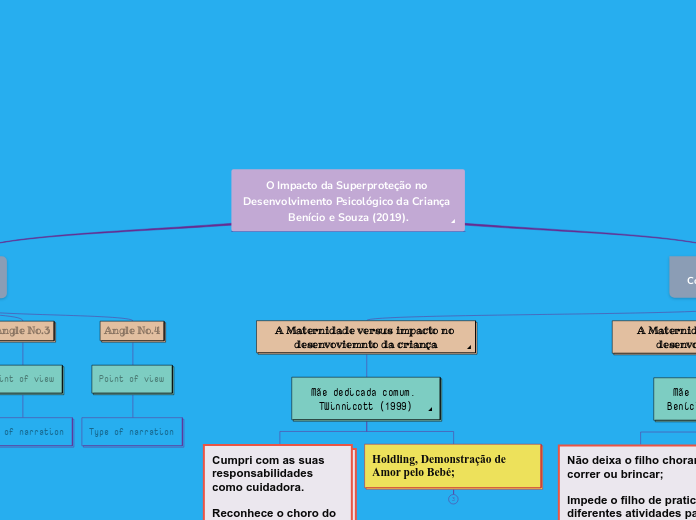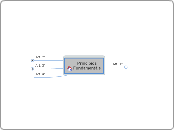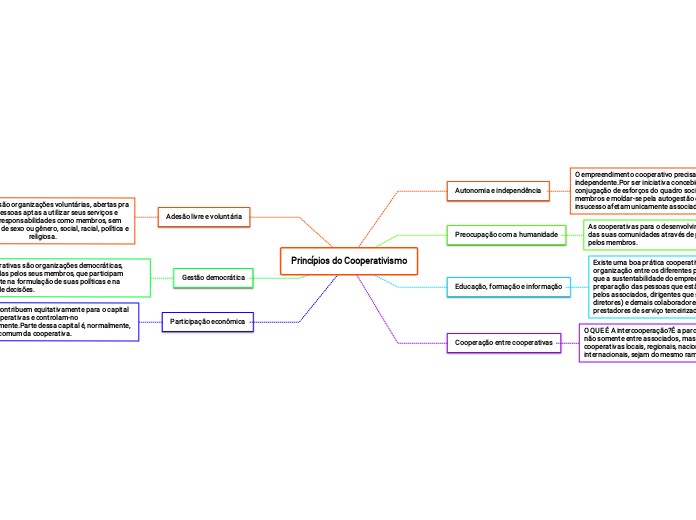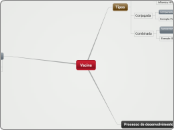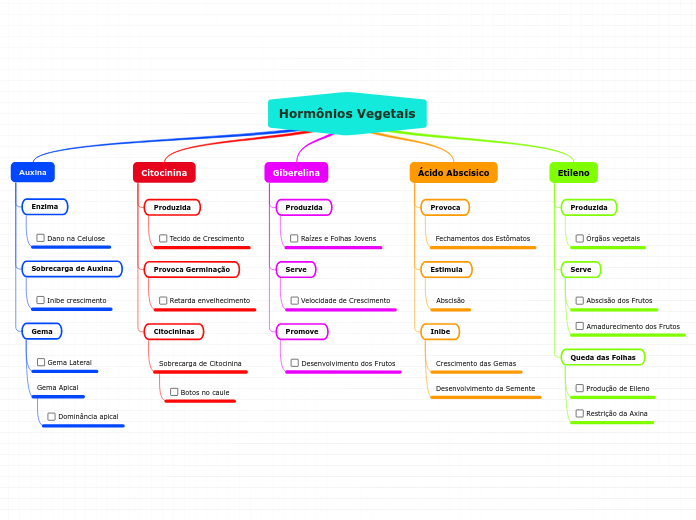O Impacto da Superproteção no Desenvolvimento Psicológico da Criança Benício e Souza (2019).
Type in the name of the multiple-perspectives text.
Example: Bridge to Terabithia by Katherine Paterson
Conceitos Chaves
Mãe suficientemente boa. Winnicott (2001)
Criança Autonoma;
Um ser individual e existe sem a mãe;
Criativa, positiva, ativa e independente;
Proporciona cuidados com a adequada intensidade e no tempo de desenvolvimento correto.
Não se atormenta ou se menospreza por seus erros ou falhas.
Mostra o seu filho ao mundo gradualmente, em consonância com a capacidade que o mesmo vai demostrando perante as situações ao qual é exposto.
A Maternidade versus impacto no desenvovimento da criança
Mãe superprotetora. Benício & Sousa (2019)
Atraso no desenvolvimento;
Dependência emocional;
Fraca autonomia;
Dificuldades de socialização;
Insegurança
Não deixa o filho chorar, correr ou brincar;
Impede o filho de praticar diferentes atividades para as quais já possui competências físicas, motora ou intelectual para o fazer;
A Maternidade versus impacto no desenvoviemnto da criança
Mãe dedicada comum. TWinnicott (1999)
Type in a relevant quote that highlights the character's point of view towards
Conceitos Chaves.
Try following a citation format: author's name, chapter, and page.
Example: 'Jesse drew the way some people drank whiskey. (...) Lord, he loved to draw. (...) When he was in first grade, he told his father that he wanted to be an artist when he grew up.' (Paterson, 2. 7)
Holdling, Demonstração de Amor pelo Bebé;
Handling, Consciência do seu corpo através dos cuidados da mãe;
Apresentação do Objeto, Diminuição da necessidade da presença materna.
O impacto psicologico na vida da criança cuidada pela mãe dedicada comum é semelhante o da mãe suficientemente boa.
Cumpri com as suas responsabilidades como cuidadora.
Reconhece o choro do bebê, e as suas necessidades através do mesmo.
Desempenha o seu papel de mãe instintivamente, sem necessitar de ser ditado ou ensinado.
O ambiente facilitador proporcionado a criança visa o seu desenvolvimento.
Issue
Identify an important issue from the text that is being presented from different angles. Type it in.
Example: Jesse's drawing talent.
Angle No.4
Decide on the fourth point of view
Type in the name of the last character whose perspective on the issue you are going to present.
Example: Leslie Burke, Jesse's new next-door neighbor, and best friend.
Point of view
Type in a relevant quote that highlights the character's point of view. Try to follow a citation format: author's name, chapter, and page.
Example: I can't get the poetry of the trees,' he said. She nodded. Don't worry,' she said. You will someday. He believed her.' (Paterson, 4. 24)
How is the viewpoint introduced in the story?
Choose an answer:
First person point of view - using the personal pronouns 'I' or 'we'Second person point of view - using the personal pronoun 'you'Third person point of view - using the third-person pronouns 'he', 'she' and 'they'Omniscient point of view - an all-seeing observer tells the story
Angle No.3
Whose character does the third point of view belong to?
Type in his/her name.
Example: Mr. Aarons, Jesse's father.
What does the character think, say or do that suggests their perspective on the issue?
Type in a quote and try to maintain the citation format.
Example: 'He would like to show his drawings to his dad, but he didn't dare. (...) He'd thought his dad would be pleased. He wasn't. What are they teaching in that damn school? he had asked.' (Paterson, 2.8)
What kind of narration introduces the viewpoint?
Choose an answer:
First person point of view - using the personal pronouns 'I' or 'we'Second person point of view - using the personal pronoun 'you'Third person point of view - using the third-person pronouns 'he', 'she' and 'they'Omniscient point of view - an all-seeing observer tells the story
Angle No.2
Decide on the second point of view
Name the character (it can either be the main character or one of the supporting characters) whose point of view you are presenting.
Example: Miss Edmunds, Jesse's music teacher.
Type in a quote that points out the character's position about the issue.
Try to follow a citation format: author's name, chapter, and page.
Example: 'She said he was unusually talented, and she hoped he wouldn't let anything discourage him.' (Paterson, 2. 8)
How is the viewpoint introduced in the story?
Choose an answer:
First person point of viewSecond person point of viewThird person point of viewOmniscient point of view
Angle No.1
Decide on the first point of view you are going to present.
Type in the name of the character (it can either be the main character or one of the supporting characters) whose point of view belongs to.
Example: Jesse Oliver Aarons, Jr., the main character of the novel, a fifth-grader living in a rural Southern area.
Point of view
Type in a relevant quote that highlights the character's point of view towards
Issue.
Try following a citation format: author's name, chapter, and page.
Example: 'Jesse drew the way some people drank whiskey. (...) Lord, he loved to draw. (...) When he was in first grade, he told his father that he wanted to be an artist when he grew up.' (Paterson, 2. 7)
Type of narration
What type of narration introduces the viewpoint?
Choose an answer:
First person point of view - using the personal pronouns 'I' or 'we'Second person point of view - using the personal pronoun 'you'Third person point of view - using the third-person pronouns 'he', 'she' and 'they'Omniscient point of view - an all-seeing observer tells the story
